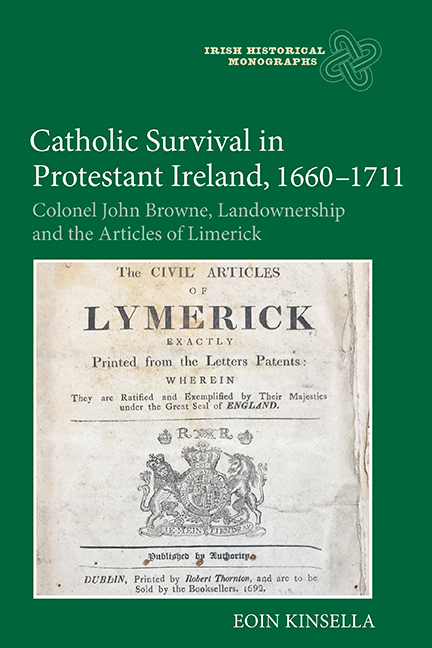 Catholic Survival in Protestant Ireland, 1660–1711
Catholic Survival in Protestant Ireland, 1660–1711 Book contents
- Frontmatter
- Dedication
- Contents
- List of Illustrations
- Acknowledgements
- List of Abbreviations
- Editorial Note
- Glossary
- Introduction
- Part I The Rise and Fall of the ‘New Interest’
- Part II The Articles of Surrender
- Part III Article 13 of Limerick
- 6 ‘This clause was surreptitiously obtained’: Implementing article 13 of Limerick, 1691–8
- 7 ‘I fear a bill relating to me be gone for England’: Implementing article 13 of Limerick, 1698–1708
- 8 ‘I am plagued with a quarrel’: The Browne family and the gentry of Connacht, 1692–1711
- Conclusion
- Appendix A Articles of Surrender, 1690–91
- Appendix B Hearings scheduled for adjudication under the articles of Limerick, 1694
- Appendix C Proclamations of 7 July & 1 August 1691; ‘A copy of and answers to several complaints made by the Irish by their agent Mr Cockly’
- Bibliography
- Index
7 - ‘I fear a bill relating to me be gone for England’: Implementing article 13 of Limerick, 1698–1708
from Part III - Article 13 of Limerick
Published online by Cambridge University Press: 28 June 2018
- Frontmatter
- Dedication
- Contents
- List of Illustrations
- Acknowledgements
- List of Abbreviations
- Editorial Note
- Glossary
- Introduction
- Part I The Rise and Fall of the ‘New Interest’
- Part II The Articles of Surrender
- Part III Article 13 of Limerick
- 6 ‘This clause was surreptitiously obtained’: Implementing article 13 of Limerick, 1691–8
- 7 ‘I fear a bill relating to me be gone for England’: Implementing article 13 of Limerick, 1698–1708
- 8 ‘I am plagued with a quarrel’: The Browne family and the gentry of Connacht, 1692–1711
- Conclusion
- Appendix A Articles of Surrender, 1690–91
- Appendix B Hearings scheduled for adjudication under the articles of Limerick, 1694
- Appendix C Proclamations of 7 July & 1 August 1691; ‘A copy of and answers to several complaints made by the Irish by their agent Mr Cockly’
- Bibliography
- Index
Summary
From September 1698 until his death in 1711, the bulk of John Browne's time was occupied by the sale of his estate and the process of clearing his debts. A second act of parliament to regulate the sale of the Browne estate was found to be necessary as early as 1697. The first two sections of this chapter examine several attempts to have this second act passed by the Irish parliament in 1698 and again during the session of 1703–4, before eventual success in 1705. Even that was not the final word on the matter, with a third act sought in 1709. The efforts of 1698 were important as they marked the first time that Browne was not actively involved in seeking the acts, which threatened to take away whatever control he still retained of his affairs. Browne fought hard against such a scenario, occasionally making a personal appearance in Dublin, though more usually relying on his eldest son, Peter, and various agents to protect his interests in Dublin and in London. Section III traces the sale of the Browne estate between 1698 and 1708, and payments made to creditors in the same period. By the time the process had concluded, almost nothing of Browne's once vast estate remained in his possession. Peter Browne became increasingly important in this process as the seventeenth century drew to a close. Peter's ambitions in life were subordinated to his family obligations as heir to the estate – or what little would remain once his father's debts were paid. Perhaps the greatest challenge facing Peter was the daunting prospect of rebuilding his family's landed interest and fortune. That work was undertaken as the sale of the estate progressed. Several purchasers of the estate clearly acted in concert with the Brownes, allowing Peter to immediately take out favourable leases as he sought to resurrect his family's fortunes.
A combination of factors had prevented Browne and his creditors securing a second act for the sale of the estate in 1697. For his creditors, a second act was desirable to speed up the sale process, which had not begun by the end of the year. For Browne, a second act was imperative to renew his freedom from arrest for debt, which expired on 1 November 1697.
- Type
- Chapter
- Information
- Catholic Survival in Protestant Ireland, 1660–1711Colonel John Browne, Landownership and the Articles of Limerick, pp. 178 - 209Publisher: Boydell & BrewerPrint publication year: 2018
